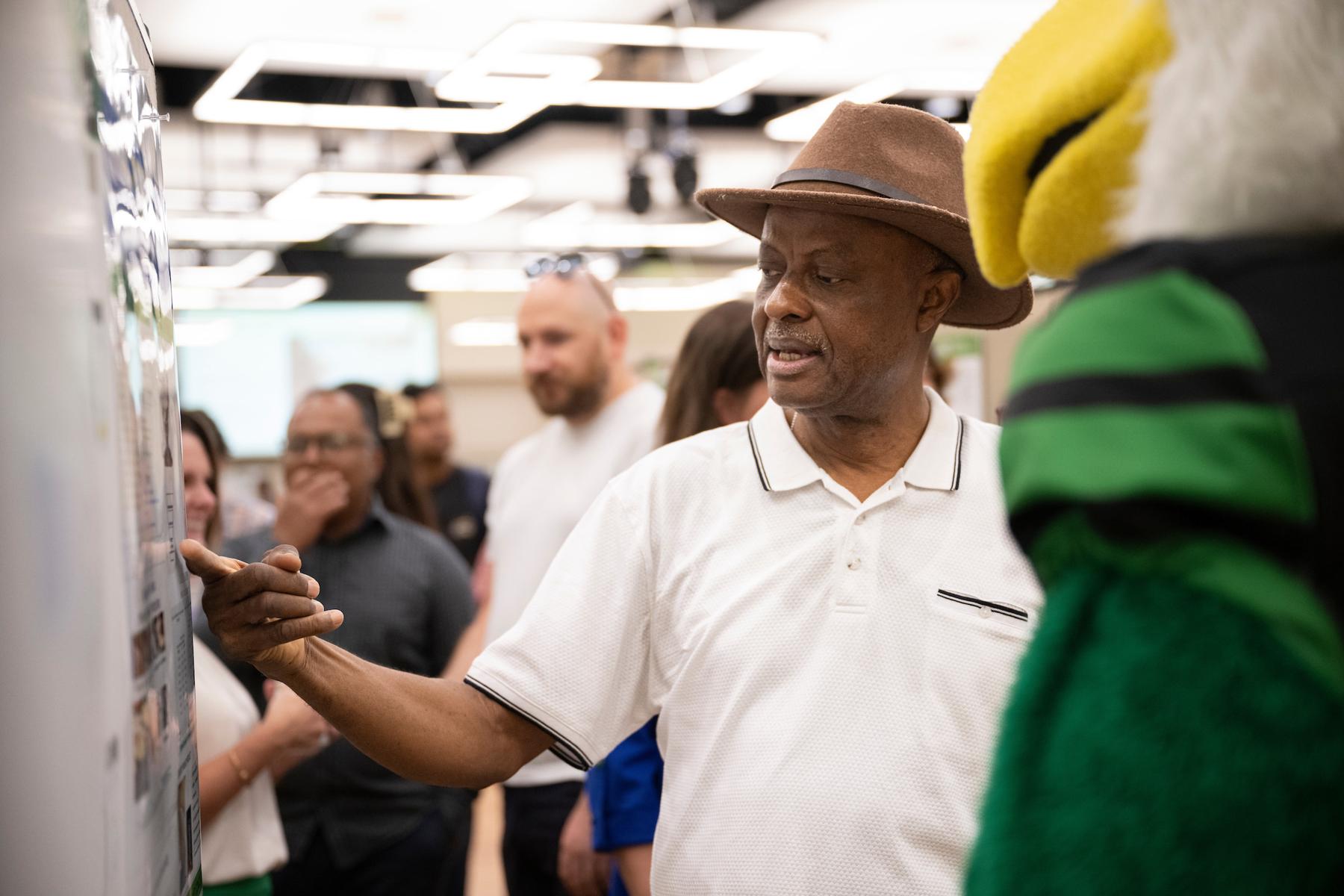 DENTON (UNT), Texas — The Oct. 4 event included hundreds of attendees and spanned
multiple rooms in the UNT University Union. UNT’s Division of Research and Innovation
sponsored the event to encourage faculty, staff, postdoctoral researchers, and graduate
and undergraduate students to gather in one place to share their research, connect
with one another and listen to panel discussions about everything from tips on commercializing
research and establishing interdisciplinary projects to understanding the importance
of mentorship and staff support in a research community. A Research Resource Fair
also offered individuals an opportunity to connect with different resources on campus,
student organizations and departments to help with their research endeavors.
DENTON (UNT), Texas — The Oct. 4 event included hundreds of attendees and spanned
multiple rooms in the UNT University Union. UNT’s Division of Research and Innovation
sponsored the event to encourage faculty, staff, postdoctoral researchers, and graduate
and undergraduate students to gather in one place to share their research, connect
with one another and listen to panel discussions about everything from tips on commercializing
research and establishing interdisciplinary projects to understanding the importance
of mentorship and staff support in a research community. A Research Resource Fair
also offered individuals an opportunity to connect with different resources on campus,
student organizations and departments to help with their research endeavors.
As UNT continues to grow its research enterprise and rise as a Tier One research university, it is clear progress can’t happen without people coming together. Aaron Roberts, associate vice president for research and innovation, says an interdisciplinary mindset will be key in moving UNT’s research community forward.
“It’s so important that we take opportunities to come together like this,” Roberts said. “We’re all busy in our own departments, colleges and labs, but University Research Day gives us a dedicated time to learn about each other’s work and potentially establish relationships that could spark new paths of discovery. This event is all about celebrating and cultivating the interdisciplinarity that is at the core of UNT’s research community.”
Showcasing Student Researchers
Research Day opened with more than 250 students presenting their research from disciplines across the university. Aisles of displayed posters in the University Union Emerald Ballroom were brimming with faculty, staff and students.
“We had posters from artists, physicists, biologists and more,” Roberts said. “And we purposefully mixed them up on the displays, so there would be researchers from a variety of disciplines side-by-side engaging in discussions.”
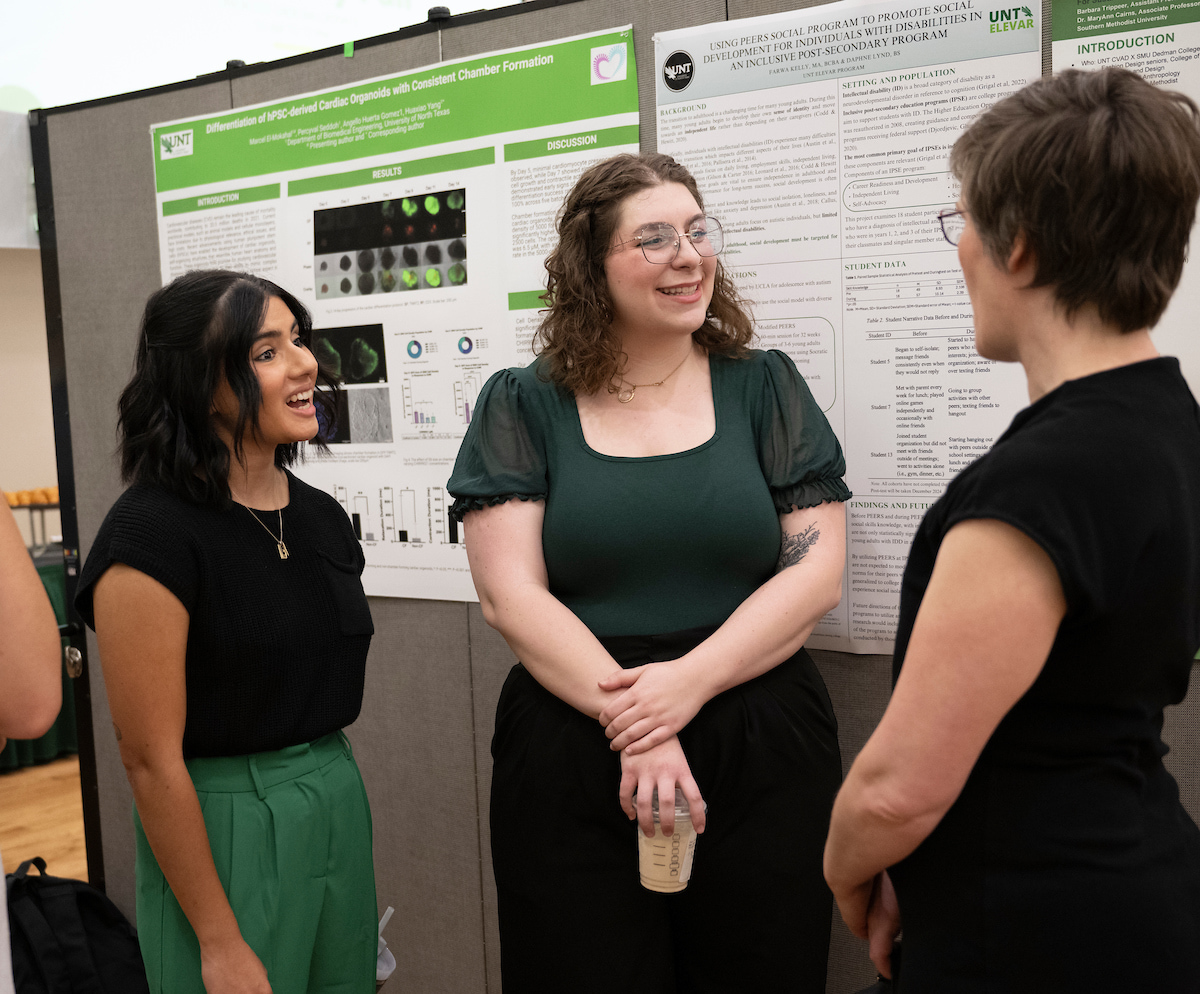 A select number of students also had the opportunity to give quick “lightning” talks
about their research during two afternoon panel sessions.
A select number of students also had the opportunity to give quick “lightning” talks
about their research during two afternoon panel sessions.
First up was Anil Girija, a postdoctoral researcher in biological sciences working in distinguished research professor Jyoti Shah’s lab. His research focuses on plants’ genes to boost defense against pests. “By 2028, one billion people are predicted to be affected by food scarcity,” Girija said. “That means we need to increase our production, but 40% of crops is lost to pest infestations.”
Faith Gantz, a materials science graduate student who works alongside associate professor Marcus Young, presented her research into shape memory alloys. Her focus is on microscopic damage done to the alloys after being fatigue tested. “I’m looking at the residual effects of these tests so we can identify what deformations are happening and better provide a solution for the next iteration of alloys,” Gantz said.
Chibuike Ezeilo, a graduate student working with mechanical engineering professor Kuruvilla John, showed his design for a machine that can help process cassava roots into gari, a staple food in tropical African countries. “Cassava may be common, but gari is scarce and costly,” Ezeilo said. “This will make it so homes and small businesses can make their own.”
Leigh Parrott, a graduate student in physics who works with associate professor Ohad Shemmer, finished the first student panel with her research on quasars, active galactic nuclei powered by supermassive black holes. Parrot studied the accretion rates of quasars using newly created reverberation mapped black hole mass measurements. “These new measurements raised doubts of a correlation between the equation’s variables, but we still found a small but significant correlation with the new measurements,” Parrott said.
In the next student panel, Samantha Dardaman, doctoral student in human performance and movement sciences, lead off with research on the perceptions of ill-fitting gear for female firefighters. Firefighter gear and uniforms are generally designed to fit male bodies. Dardaman’s study highlights the importance of sex-specific and well-fitting gear. “This will not only aid the current firefighters in their job performance and their execution now, but may also create a more accessible female occupation in the future,” Dardaman said.
Next, graduate students Alexandra Candelaria and Xaria Hicks from the College of Education presented research on how mothers of children with autism spectrum disorder from marginalized communities navigate the diagnostic process and get care. Candelaria said, “Participants faced significant barriers, including language and financial constraints when accessing services.” Their sequential mixed-methods study highlighted the importance of addressing cultural stigmas and improving resource accessibility for these communities.
Marisa Gonzales, doctoral student in sociology, presented research on Name, Image, and Likeness (NIL) policies in collegiate sports. Gonzales examined female athletes’ experiences, highlighting challenges like securing deals and concerns about authenticity. “For the majority of students, NIL is not going to be life-changing, but it certainly has the potential to be life-enhancing,” Gonzales said.
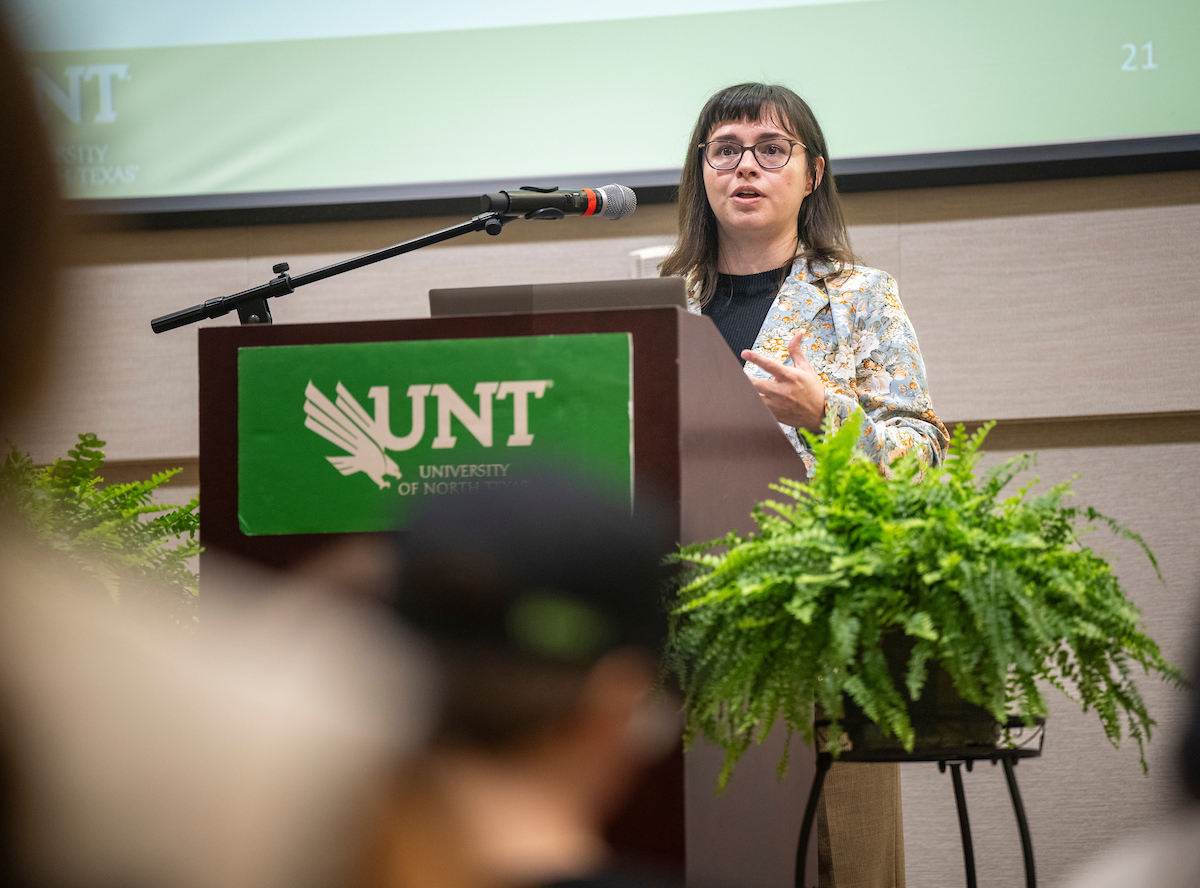 Lastly, Rongfang Zhan, rehabilitation and health services graduate student, shared
research findings on the health benefits of extending retirement age. Individuals
with higher socioeconomic status appear to receive some health benefits by delaying
retirement, while the opposite appears true for those with lower socioeconomic status.
“Increasing retirement age could be beneficial to the health and wellbeing of older
adults,” Zhan said.
Lastly, Rongfang Zhan, rehabilitation and health services graduate student, shared
research findings on the health benefits of extending retirement age. Individuals
with higher socioeconomic status appear to receive some health benefits by delaying
retirement, while the opposite appears true for those with lower socioeconomic status.
“Increasing retirement age could be beneficial to the health and wellbeing of older
adults,” Zhan said.
UNT has many opportunities for students to get involved in research on campus, but Brenda Barrio, assistant vice president for research and innovation, is focused on making sure students know about those opportunities and is working to cultivate new ways for students to gain the research experience they need to launch their careers in competitive markets in Texas and beyond.
During the closing reception, Barrio announced that UNT is among only 10 public universities in the state selected to participate in the first cohort of the Texas Leadership Research Scholars Program, supported by the Texas Higher Education Coordinating Board. The new program that launched this fall gives selected doctoral researchers a nearly $18,000 scholarship.
“This program will not only bring financial support for these doctoral researchers to continue their education, but also give them access to a peer network and mentoring that will help set them up for career success after they graduate,” Barrio said.
The Texas Leadership Research Scholars at UNT are: Garrett Cayce in the College of Engineering; Araceli Herrera Mondragon, Celeste Ortega-Rodriguez and Jose Robledo in the College of Science; Christian Quintero in the College of Education; and Emma Wimberg in the College of Music.
Better Together: Building a Thriving Research Community Through Mentorship
The afternoon panel sessions kicked off with concurrent discussions, including one where faculty members explored how effective mentorship fosters collaboration and success within a research community.
“The personal growth that’s associated with mentoring, the career growth and the networking opportunities are just invaluable,” said Angie Cartwright, assistant vice provost for faculty success and professor of counseling and higher education. Cartwright oversees the UNT Faculty Mentoring Program, which provides resources, tools and structured support for faculty mentors and mentees.
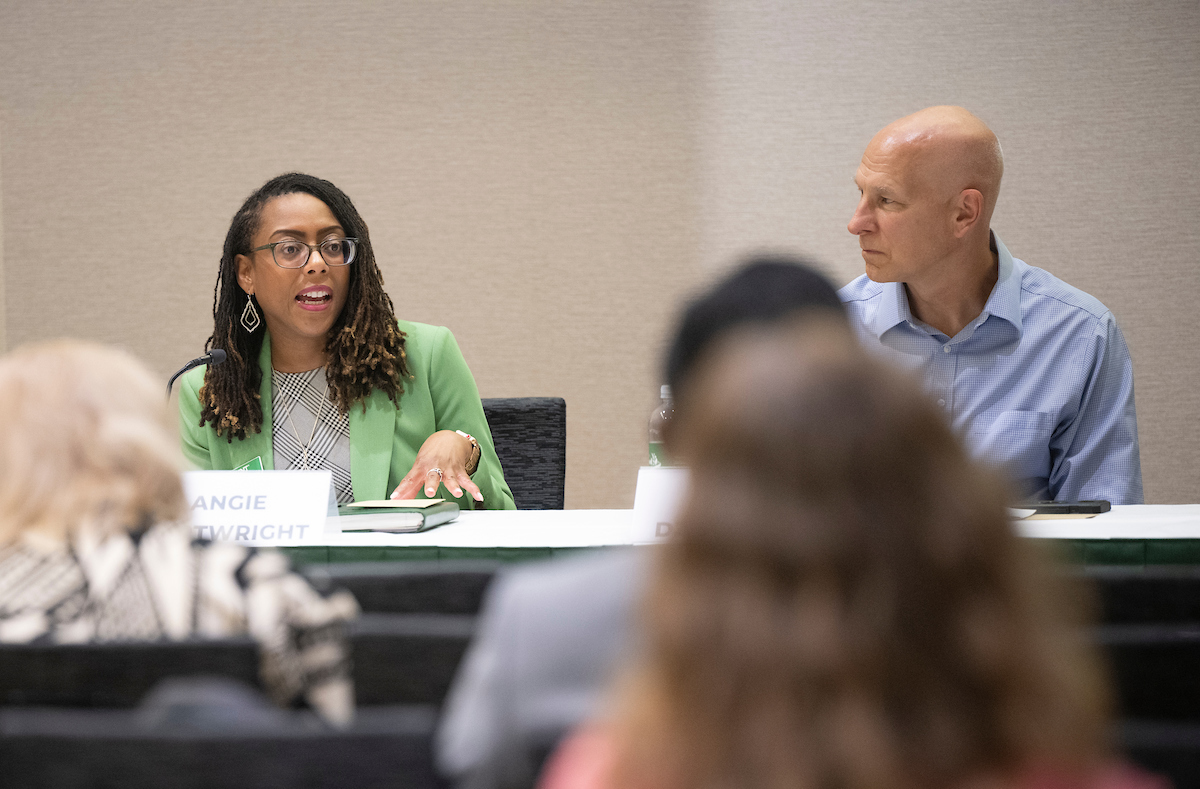 Mentorship is particularly important in a research setting, where students and early
career faculty are learning how to navigate the complex world of research — including
how to narrow their focus, secure funding, problem-solve, get published and more.
Mentorship is particularly important in a research setting, where students and early
career faculty are learning how to navigate the complex world of research — including
how to narrow their focus, secure funding, problem-solve, get published and more.
“There’s a lot of stuff you learn in the classroom environment, but there’s a lot that you don’t,” said Melanie Ecker, assistant professor of biomedical engineering.
“A lot of these things are discipline-specific, specific technical skills in the lab, but it’s also about soft skills and personal development. This is where good mentorship comes in. Having someone who’s there for you, showing you, ‘This is how you make a research poster. This is how you make a good research poster. This is how you present a poster.’ Someone to give you an environment where you can try and fail, and learn from your failure. To open doors for you and show you what your future could look like.”
A recurring theme was the need for multiple mentors, not just from one’s own discipline but also from other fields and professions who can provide different perspectives.
“I’ve had multiple mentors over the years, and I see that as a really big part of my success,” said Dornith Doherty, Distinguished Research Professor of studio art.
“It’s a way of wayfinding, especially in the arts where there isn’t a clear ladder that you would follow for success. Sometimes you’re on the path, but you don’t recognize that you’re doing the right thing, and so you’re filled with doubt. Having those multiple mentors and multiple points of view while you’re trying to assess the situation has been really valuable for me.”
Start Smart: Best Practices for Creating a Startup
Creating a startup can seem daunting. An idea forms for a new technology or invention but knowing what to do next can stop an entrepreneur in their tracks. For professors, the barriers can be compounded juggling a growing business with their academic responsibilities.
In another discussion during the first session of panels, UNT College of Engineering faculty shared their experiences of creating a startup out of their research. One of those inevitable experiences is failure.
Wonbong Choi’s company, Ark Power Technology, which focuses on advanced rechargeable battery technologies, has risen from failure. “The company went bankrupt. No money in the bank account,” he said.
Now, Choi’s company has added new team members and secured new funding. Earlier this year, Ark Power Technology was featured as one of 14 startups to watch by PitchFact after participating in the Texas A&M New Ventures Competition.
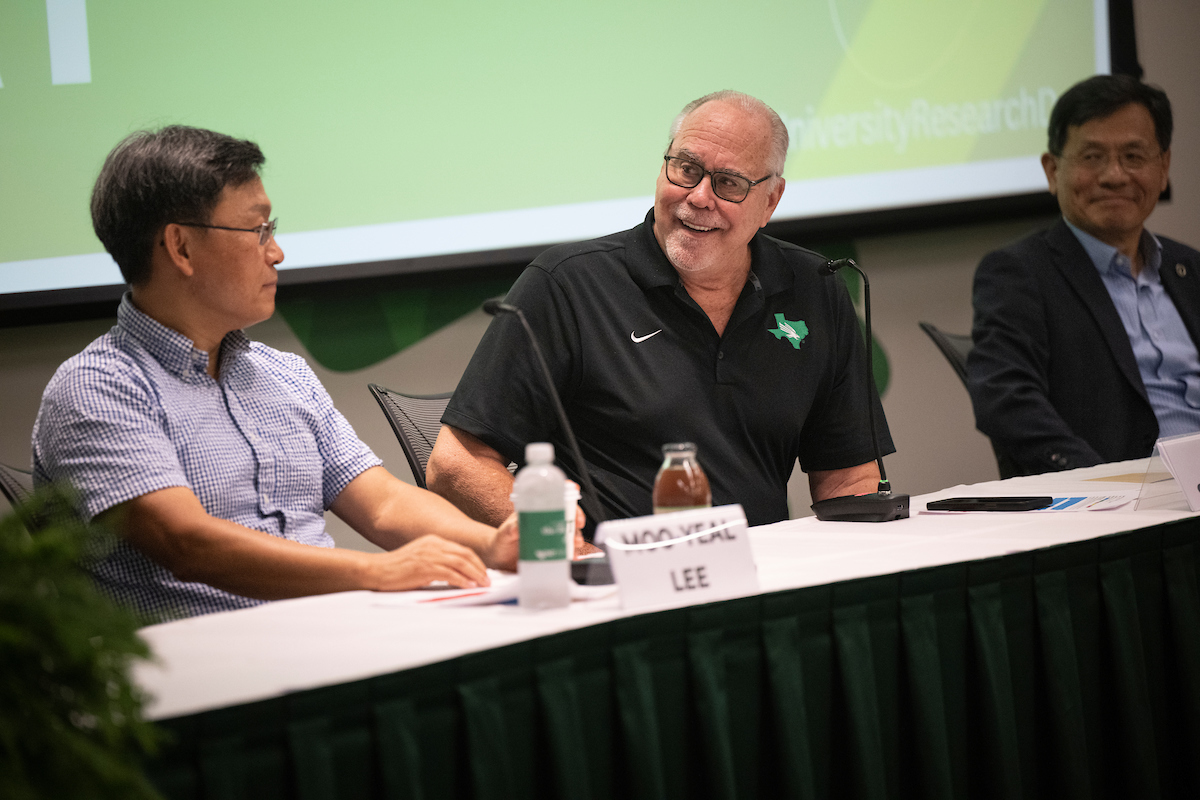 Moo-Yeal Lee, associate professor of biomedical engineering, and Rajiv Mishra, University
Distinguished Research Professor in materials science and engineering, also have experienced
funding issues with their startup, adding marketing and branding to the list of challenges.
Moo-Yeal Lee, associate professor of biomedical engineering, and Rajiv Mishra, University
Distinguished Research Professor in materials science and engineering, also have experienced
funding issues with their startup, adding marketing and branding to the list of challenges.
However, a familiar face on the panel, professor of biology and former UNT president Neal Smatresk, felt energized by the other panelists’ stories of failure — and overcoming. “These stories of failure are inspiring,” he said.
Smatresk is currently creating curriculum for a class called STEM Startups, which launches in Spring 2025. The course will educate graduate students from the College of Engineering and the College of Business about building a startup from the ground up.
Amir Jafari, biomedical engineering associate professor, founded a soft robotics startup that brings robotics to elementary classrooms as well.
“I noticed from students there is a gap in STEM knowledge in different countries,” he said. “I thought robotics was a perfect media to teach the concepts of physics and math that will be really exciting for the students.”
Every panelist, in their startup’s failures, found out quickly they needed to seek out people who have expertise in other areas to ensure their startup would succeed.
“I am good at some things, but lacking in others,” Choi said. “We need to collaborate together and bring out those needed skills.”
A shared goal was clear among the panelists — drive innovation and support entrepreneurship at UNT among faculty and students.
“We have to change the culture and train our students to innovate,” Smatresk said.
Be Curious: Innovative Approaches to Interdisciplinary Research
Having researchers from a range of disciplines working on one project can bring a wealth of perspectives and introduce new dimensions to the work that wouldn’t be possible going it alone. But initiating and conducting interdisciplinary research isn’t easy, panelists agreed.
To this end, Roberts led a panel focused on ways to lead successful projects with colleagues across the university.
Cassini Nazir, assistant professor of design, has found that asking more questions at the beginning of an interdisciplinary project can help in establishing everyone’s roles and where people are coming from. Also, Nazir has learned from experience that it’s important to be mindful that language connotations can vary from discipline to discipline.
How the physical workspace is set up can naturally yield more interdisciplinary research ideas, said Nigel Shepherd, associate professor of materials science and engineering, who shares a lab space with Andrey Voevodin, professor and associate dean for research in materials science and engineering.
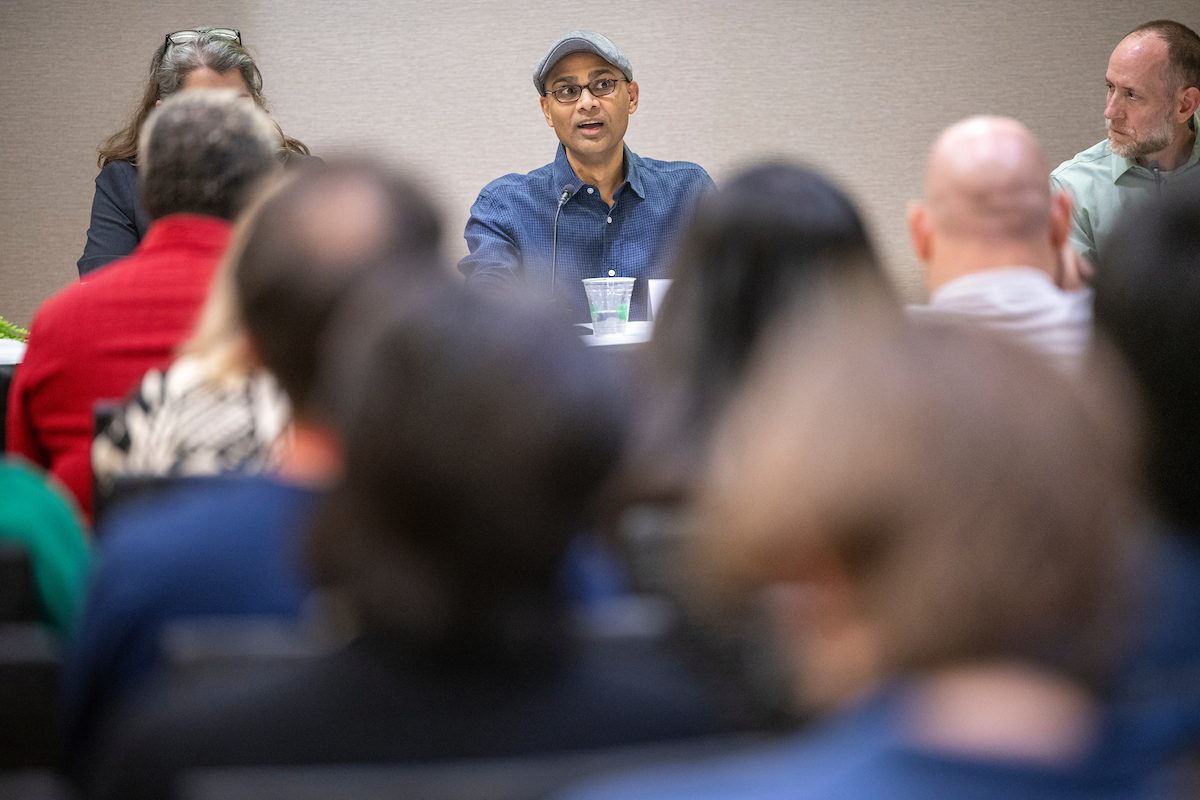 Open-concept, shared lab spaces with researchers from different disciplines working
side-by-side was a purposeful design choice in the recently completed renovation of
the UNT Science Research Building’s second floor and will be prevalent in the forthcoming
Science and Technology Building.
Open-concept, shared lab spaces with researchers from different disciplines working
side-by-side was a purposeful design choice in the recently completed renovation of
the UNT Science Research Building’s second floor and will be prevalent in the forthcoming
Science and Technology Building.
But even after teams get together and everyone agrees on a meaningful idea to pursue, the work doesn’t stop there. Shepherd said persistence is key in making sure the collaborative team doesn’t lose momentum in working toward a research goal.
“Be intentional about it and be purposeful about engagement,” Shepherd said. “You have to keep following up.”
Kathy Dreyer, senior proposal manager for the Jim McNatt Institute for Logistics Research, suggested several ways researchers could get plugged into interdisciplinary work, such as reaching out to proposal mangers like herself who can help connect faculty with similar research interests, and looking at recently funded projects to see the disciplinary makeups of teams.
The panelists agreed that students are an untapped resource.
“They make friends across different labs,” said Ed Mager, associate professor of biological sciences. “Sometimes they know more about what’s going on in other research labs than you do.”
Working Together: The Importance of Staff Support in the Research Enterprise
Staff members play a critical role in advancing UNT’s reputation as a Tier One research university, said vice president for research and innovation Pamela Padilla, who moderated a panel about the value of staff support.
“We would not be able to deliver what we do without our staff members,” Padilla said. “All of them impact students positively, directly and indirectly. There’s a lot of invisible work on campus that helps our students. We see it and we appreciate it.”
UNT research scientist Saul Sepulveda assists students with surface microscopy and spectroscopy in the Materials Research Facility at UNT’s Discovery Park, which is one of the most advanced university research facilities in the nation for materials analysis — from the atomic to macro scales.
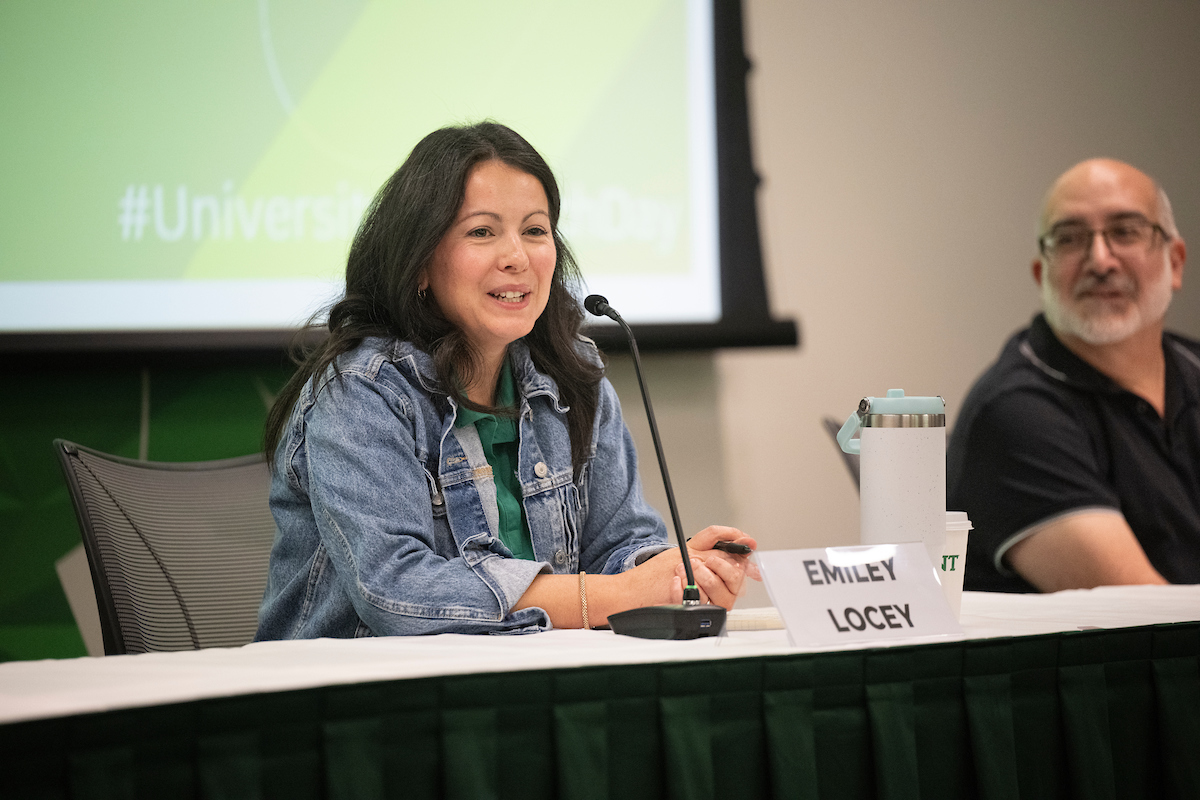 “I keep things going in the lab by greasing the wheels, sometimes literally greasing
the wheels,” Sepulveda said.
“I keep things going in the lab by greasing the wheels, sometimes literally greasing
the wheels,” Sepulveda said.
“My favorite part is interacting with people. With the students, I am one of their first trainers on high-tech or advanced instrumentation. I get to establish a rapport and really affect their outlook on what UNT has to provide them, what kind of resources they have at their disposal. And they get excited and it’s refreshing to see that almost daily.”
Joining Sepulveda on the Staff Support panel was fellow research scientist Minh Vu, who manages the Genomics Center in UNT’s BioDiscovery Institute, and from grants and contracts administration, financial analyst Isaac Collins and director of pre-award Emiley Locey.
“I thoroughly enjoy developing relationships with our faculty members,” Locey sayid “I’m getting to see firsthand their excitement for their research and what it is that they’re doing and passionate about. And then we’re typically the first ones to hear that it’s been funded, so there’s the excitement and the joy that brings — and knowing that we’re part of that bigger picture of the strategic vision for the university.”